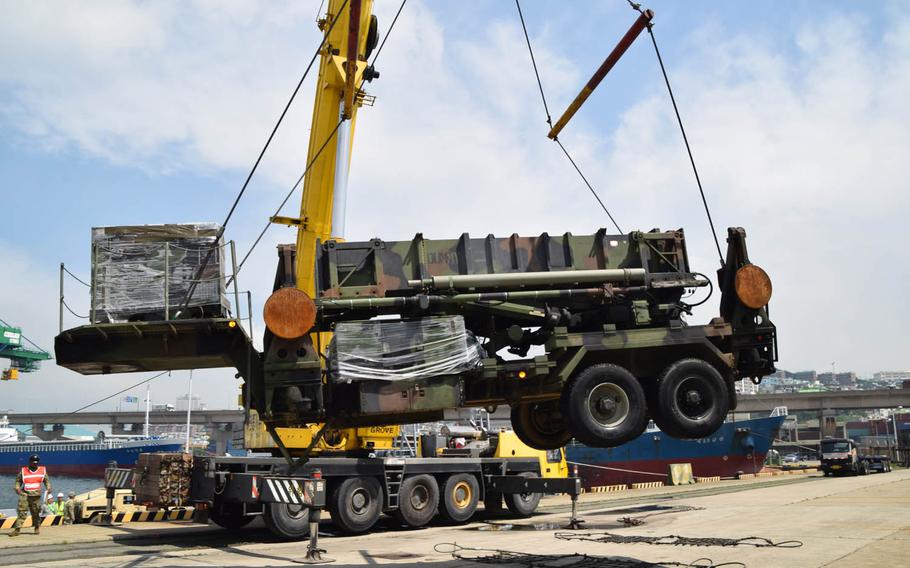
A Patriot missile-launching system arrives at the Port of Busan, South Korea, July 13, 2016, as part of an exercise aimed at quickly deploying U.S. air-defense crews from Japan to Korea in an emergency. (Jonathon Daniell/U.S. Air Force)
A U.S. Patriot missile-defense battery arrived in South Korea last week in the wake of a controversial announcement that the allies have agreed to base an even more advanced missile defense system on the peninsula.
The PAC-3 Patriot battery showed up on July 13 as part of an exercise aimed at quickly deploying U.S. air-defense crews from Japan to Korea in an emergency, a U.S. official told the South’s Yonhap news agency.
“The exercise is designed to enhance reception, staging, onward movement and integration capabilities,” said Capt. Joseph Reney, U.S. Forces Japan spokesman, who confirmed the deployment in an email Friday. “After the joint military exercise, the Patriot Battery will be returning to Japan.”
North Korea fired three ballistic missiles into the sea Tuesday in a fiery answer to Seoul and Washington’s July 8 announcement that the Terminal High-Altitude Area Defense system, known as THAAD, would be deployed in a mountainous area southeast of Seoul by the end of next year.
South Korean Unification Ministry spokesman Jeong Joon-hee condemned the launches, saying there was a chance North Korea could conduct another nuclear test any day. Tensions have been rising on the peninsula since the North staged its fourth nuclear test in January, followed a month later by a long-range rocket launch, then a series of other missile tests, despite a fresh round of toughened U.N. sanctions.
“Our government is keeping a close watch on the situation by working closely together with U.S. and is fully prepared to deal with the possibility,” he said.
Kim Hyun-wook, an American studies professor at the Korean National Diplomatic Academy, said South Korea sees the deployment of missile defense systems such as THAAD and the Patriot as signs that cooperation between the nations in dealing with North Korea is more important than ever.
Kim predicted North Korea will continue its nuclear build-up, despite the sanctions, with a goal of becoming a capable nuclear-armed state.
It’s more likely that the North will conduct a fifth nuclear test before the U.S. presidential election in November than carry out other provocations that might result in tougher sanctions, he said.
A North Korean Foreign Ministry spokesman, quoted in the North’s state-run Rodong Sinmun newspaper, also warned that there was no guarantee that next month’s Ulchi-Freedom Guardian exercise, involving U.S. and South Korean forces, wouldn’t lead to “igniting the fuse of a nuclear war.”
Stars and Stripes reporter Yoo Kyong Chang contributed to this report.
robson.seth@stripes.com Twitter: @SethRobson1